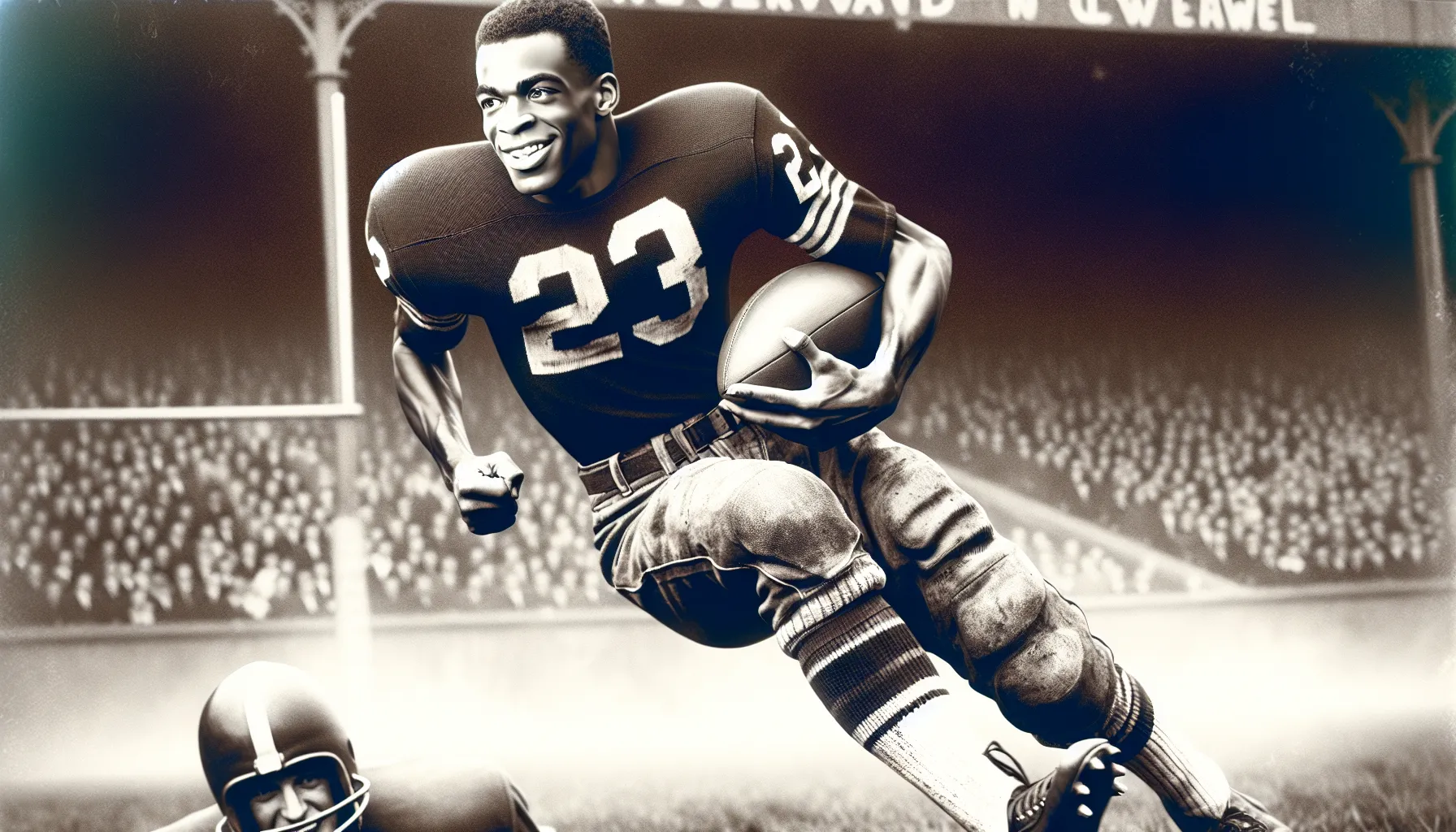Key Takeaways
- Jim Brown is the only rookie in NFL history to win the MVP award, achieving this feat in 1957 with the Cleveland Browns.
- Winning the NFL MVP as a rookie is extremely rare due to the steep learning curve, physical demands, and challenges of competing against seasoned players.
- Rookies face unique obstacles, including adapting to the NFL’s pace, learning complex playbooks, and excelling amidst team dynamics and positional demands.
- While impressive rookie performances, such as those by Randy Moss, Cam Newton, Ezekiel Elliott, and Robert Griffin III, have stood out, they fell short of MVP recognition.
- MVP voting heavily favors experienced players with proven track records, as consistency, individual excellence, and team success carry significant weight.
- Jim Brown’s exceptional MVP win reflects a rare combination of talent, opportunity, and historical context, which has not been replicated by any other rookie to date.
When it comes to the NFL, the MVP award is one of the highest honors a player can achieve. It’s a title that represents dominance, leadership, and excellence on the field. But I’ve often wondered—has a rookie ever managed to pull off such an incredible feat? After all, stepping into the league as a newcomer is challenging enough without the added pressure of outperforming seasoned pros.
The idea of a rookie winning MVP feels almost mythical. It’s rare to see a first-year player take the league by storm and leave such an undeniable mark. But in a sport full of surprises and record-breaking moments, anything’s possible, right? Let’s dive into the history of the NFL and see if any rookie has ever reached this extraordinary milestone.
Understanding The NFL MVP Award
The NFL MVP Award recognizes exceptional performance and outstanding leadership. It’s considered one of the highest individual honors in professional football.
History And Significance
The NFL MVP Award began in 1957 and is annually presented by the Associated Press (AP). Its goal is to honor the league’s most valuable player, celebrating those whose contributions have significantly shaped their team’s success. Previous winners include legends like Jim Brown, Peyton Manning, and Tom Brady. Jim Brown, the first recipient, also remains the only rookie to ever win.
Criteria For Selection
The MVP selection relies on a voting process involving a 50-member media panel. Voters evaluate players based on their individual statistics, consistency, and impact on the team’s performance. While quarterbacks and running backs dominate the award due to their influence on the game, other positions occasionally receive recognition when their season warrants it.
The Rarity Of Rookies Winning NFL MVP

Only one rookie, Jim Brown in 1957, has won the NFL MVP, underscoring how rare this feat is. The pressures of adapting to the professional level make achieving MVP almost impossible for first-year players.
Challenges Faced By Rookie Players
Rookies face immense pressure competing against seasoned athletes. Learning complex playbooks and adjusting to the NFL’s faster pace take a toll on even the most talented players. Position-specific challenges add to these obstacles. Quarterbacks need time to refine their decision-making, while running backs face physical demands that can hinder consistent performance. These factors often prevent rookies from posting MVP-level statistics.
Historical Trends And Patterns
NFL MVP voting tends to favor experienced players with proven track records. Since its inception, quarterbacks and running backs have dominated the award, with rookies rarely breaking through. Jim Brown’s win in 1957 highlights a unique case where unparalleled talent intersected with opportunity. Over the decades, the league’s increased competitiveness has made it more difficult for any rookie to achieve such recognition.
Has A Rookie Ever Won MVP In NFL History?

Jim Brown remains the only rookie to win the NFL MVP award. His dominant performance as a running back for the Cleveland Browns in 1957 set this historic milestone, which no other first-year player has duplicated.
A Look At Notable Rookie Performances
Several rookies have delivered impressive performances, but most couldn’t secure MVP recognition. For instance, in 1998, Randy Moss posted 1,313 receiving yards and 17 touchdowns, earning NFL Offensive Rookie of the Year but falling short of MVP. Similarly, Cam Newton broke records in 2011 with 4,051 passing yards and 706 rushing yards as a dual-threat quarterback. Despite these efforts, neither Moss nor Newton gained enough votes to win MVP.
Strong rookie seasons often turn heads, but MVP victories favor experienced players. High-impact statistics or game-changing contributions distinguish these rookies, yet challenges like team success and competition against established stars hinder their chances.
Analysis Of Closest Rookie MVP Contenders
Some rookies came close to MVP recognition but never won. In 2016, Ezekiel Elliott totaled 1,994 yards from scrimmage and 16 touchdowns, playing a key role for the Dallas Cowboys. However, teammate Dak Prescott and league MVP Matt Ryan overshadowed Elliott in voting. In 2012, Robert Griffin III earned accolades for his agility and precision, with 3,200 passing yards and 20 passing touchdowns, but he was still edged out.
Rookie contenders usually stand out through exceptional consistency and team impact. Yet, MVP winners usually excel in both individual performance and league-wide narrative, where rookies rarely dominate. Jim Brown’s feat exemplifies a unique alignment of skill, opportunity, and historical context not often replicated.
Factors Impacting A Rookie’s MVP Chances

A rookie’s journey to securing the NFL MVP award faces numerous obstacles. Team situations, experience levels, and the competitive nature of the league all play crucial roles in shaping their chances.
Team Dynamics And Support
Team success significantly influences MVP candidacy. MVP voters often value players on winning teams, as individual success tied to team accomplishments strengthens a player’s case. Rookies require strong offensive lines, reliable teammates, and cohesive coaching strategies to maximize their performances. For instance, a quarterback benefits from skilled receivers and solid protection, while running backs thrive with efficient blocking schemes.
Poor team performance diminishes a rookie’s MVP chances, no matter their individual stats. In 2012, Robert Griffin III achieved outstanding numbers but couldn’t compete with established stars from more dominant teams.
The Importance Of Experience
Experience serves as a critical factor, giving veteran players an edge over rookies. First-year athletes must transition from college football to the NFL’s faster pace while mastering complex systems. This steep learning curve often impacts their ability to match seasoned players in production and decision-making under pressure.
MVP voters favor consistency, a trait more commonly found in experienced players. For example, while Cam Newton’s 2011 rookie season amazed fans, his occasional mistakes highlighted gaps in experience compared to the league’s top veterans. This preference places an additional challenge on rookies striving for MVP-level recognition.
Conclusion
The NFL MVP award stands as one of the most prestigious honors in football, and the rarity of a rookie winning it only adds to its mystique. Jim Brown’s historic achievement in 1957 remains unmatched, a testament to his extraordinary talent and the unique circumstances of his time.
While rookies continue to dazzle us with incredible performances, the road to MVP glory is undeniably steep. Still, the unpredictability of football keeps the door open for future surprises. Who knows? Maybe one day, another rookie will rise to the challenge and join Jim Brown in the history books.
Frequently Asked Questions
Has a rookie ever won the NFL MVP award?
Yes, a rookie has won the NFL MVP award. Jim Brown is the only rookie to achieve this milestone, doing so in 1957. His exceptional performance as a running back distinguished him from his peers and secured him the prestigious honor.
What is the NFL MVP award?
The NFL MVP award, presented annually by the Associated Press (AP), honors the league’s most valuable player. It recognizes players for their exceptional performance, leadership, and impact on their team’s success throughout the season.
Who was the first NFL MVP?
The first-ever NFL MVP award was given in 1957 to Jim Brown during his rookie season. He remains the only rookie in NFL history to win the prestigious honor.
How is the NFL MVP decided?
The NFL MVP is decided by a voting process conducted by a 50-member media panel. Voters assess players based on their performance statistics, consistency, leadership, and overall impact on their team’s success.
Why is it rare for rookies to win the NFL MVP?
Rookies face challenges like adapting to the NFL’s faster pace, learning complex playbooks, and competing against experienced players. These hurdles make it difficult for first-year players to deliver dominant, MVP-worthy performances.
Which positions typically win the NFL MVP?
Quarterbacks and running backs dominate NFL MVP wins. These positions heavily influence games through leadership, playmaking, and scoring, which align with the award’s criteria for excellence.
Have any recent rookies come close to winning NFL MVP?
Notable rookies like Cam Newton (2011), Ezekiel Elliott (2016), and Robert Griffin III (2012) delivered outstanding seasons but fell short of winning NFL MVP due to stiff competition from established stars.
Does team success affect a rookie’s MVP chances?
Yes, team success significantly impacts MVP candidacy. MVP voters often favor players from winning teams, making it harder for rookies on struggling teams to gain recognition despite individual excellence.
What makes Jim Brown’s MVP win unique?
Jim Brown’s 1957 MVP win as a rookie stands out due to his extraordinary talent, record-setting performance, and the opportunity to excel in a less competitive league compared to today’s NFL dynamics.
Are rookies likely to win the NFL MVP in the modern era?
It’s highly unlikely. Modern rookies face tougher competition, faster gameplay, and more complex systems. While exceptional seasons are possible, MVP victories typically favor experienced players who have proven consistency and leadership.



